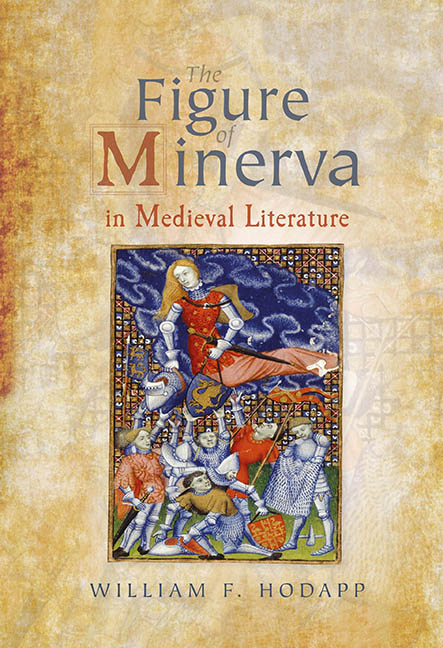Book contents
- Frontmatter
- Dedication
- Contents
- Illustrations
- Acknowledgements
- Abbreviations
- Introduction
- 1 The Roman Minerva and Elements of Medieval Classicism
- 2 The Sapiential Tradition: Minerva as Redemptress
- 3 The Martianus Tradition: Minerva as Mistress of the Liberal Arts
- 4 The Patrona Tradition: Minerva as Protectress and Benefactor
- 5 The Patristic Tradition: Minerva as Idol
- 6 The Ovidian Tradition: Minerva as Venus’ Ally
- Conclusion
- Bibliography
- Index
2 - The Sapiential Tradition: Minerva as Redemptress
Published online by Cambridge University Press: 17 October 2019
- Frontmatter
- Dedication
- Contents
- Illustrations
- Acknowledgements
- Abbreviations
- Introduction
- 1 The Roman Minerva and Elements of Medieval Classicism
- 2 The Sapiential Tradition: Minerva as Redemptress
- 3 The Martianus Tradition: Minerva as Mistress of the Liberal Arts
- 4 The Patrona Tradition: Minerva as Protectress and Benefactor
- 5 The Patristic Tradition: Minerva as Idol
- 6 The Ovidian Tradition: Minerva as Venus’ Ally
- Conclusion
- Bibliography
- Index
Summary
The medieval sapiential tradition is rooted in Jewish wisdom literature, particularly Job, Ecclesiastes, the Song of Songs, Proverbs, Ecclesiasticus, and the Wisdom of Solomon. When personified in these texts, Hokma/Sophia, or Sapientia in the Vulgate (Ecclus. 1:1–10, 24:5–11; Prov. 3:19–20, 8:22–31; Wis. 7:23–8:1), acts as a living, divine force permeating the universe. As Barbara Newman delineates, the Christian interpretation of biblical Sapientia accrued associations over time, beginning in Patristic writings with her link to Christ as Verbum Dei, the creative force in the universe, to developing links with Mary Theotokos beginning in the seventh century and Philosophia in the eighth. None of these interpretations and associations superseded the others in the Middle Ages; rather, “as the streams of tradition intermingled, each altered the connotations of the others.” These intertextual readings of Sapientia and biblical sapiential literature proved productive for medieval writers and thinkers engaging ideas of wisdom. In this chapter, I explore Minerva's association with Sapientia by examining aspects of the medieval sapiential tradition – especially in relation to love – through reading a number of texts that offer evidence of active reception and creative transformation of biblical Sapientia in the Middle Ages. From this reading, I then turn to her appearances in John Lydgate's Reson and Sensuallyte and Gavin Douglas’ Palice of Honoure where she functions as a redemptress. In this role, Minerva represents the redemptive wisdom one finds through contemplation of the universe and its maker: a wisdom grounded in love.
The Medieval Sapiential Tradition
Two brief Latin texts – both widely known throughout the Middle Ages – set the stage for understanding the medieval sapiential tradition in which Minerva at times takes part. The origin of the first is obscure, but its use and message are clear:
O Sapientia, quae ex ore Altissimi prodisti
attingens a fine usque ad finem
fortiter suaviter disponensque omnia:
veni ad docendum nos viam prudentiae
(O Wisdom, who comes forth from the mouth of the Most High, reaching from end to end mightily and ordering all things sweetly: come, teach us the way of prudence)
- Type
- Chapter
- Information
- The Figure of Minerva in Medieval Literature , pp. 44 - 80Publisher: Boydell & BrewerPrint publication year: 2019



